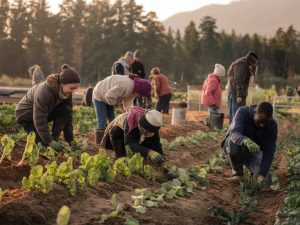How can a plant-based diet help combat climate change?
Understanding the Connection: Plant-Based Diets and Climate Change
It might come as a surprise that what’s on our plate plays a significant role in the health of our planet. With climate change becoming one of the most pressing issues of our time, many are looking at plant-based diets as a potential remedy. But how exactly can swapping steak for spinach make a difference in the fight against climate change?
The Environmental Impact of Animal Agriculture
Let’s start with some numbers. Did you know that animal agriculture is responsible for approximately 14.5% of global greenhouse gas emissions? Yes, that includes methane from those chattering cows! The livestock industry contributes more greenhouse gases than all cars, planes, trains, and ships combined. Imagine the impact if our dietary choices could redirect this trajectory.
Moreover, the land and water resources required to raise livestock are staggering. Livestock requires about 33% of the world’s arable land, leading to deforestation and loss of biodiversity. In contrast, plant-based diets demand significantly fewer resources, thus preserving our precious ecosystems.
The Nutritional Benefits of Going Green
While battling climate change, you might be pleasantly surprised to find that adopting a plant-based diet also holds a cornucopia of health benefits. Plant-based diets are rich in essential nutrients, fibers, and antioxidants. They’re associated with lower risks of heart disease, certain cancers, and type 2 diabetes. By choosing a plant-based diet, you’re nourishing both your body and the planet.
Consider the humble lentil – this tiny legume packs a powerful punch of protein and requires a fraction of the water needed to produce the same amount of beef. Now that seems like a smart trade-off, right?
Practical Ways to Incorporate More Plants
Thinking of transitioning to a plant-based diet might feel overwhelming, but it doesn’t have to be an all-or-nothing approach. Start small and simple with these practical tips:
- Begin by introducing « Meatless Mondays » into your routine.
- Explore international cuisines that naturally favor plant-based ingredients, like Indian or Middle Eastern dishes.
- Focus on whole foods – think beans, legumes, nuts, seeds, and whole grains.
- Experiment with plant-based versions of your favorite comfort foods.
Remember, even small changes in your diet can have significant environmental benefits over time.
Plant-Based Diets Anecdotes: Real Stories, Real Changes
Meet Claire, a dedicated mother of two and a lifelong meat-lover. Inspired by documentaries and her children’s future, Claire decided to shift towards a plant-based diet. Her journey wasn’t just about reducing carbon footprints; it was about rallying her family around a common goal – nurturing a healthier lifestyle and a healthier planet.
« I was amazed at how much better I felt, » Claire says, laughing off her initial skepticism. « And as a family, we’ve discovered so many new flavors and dishes we would never have tried otherwise! » Claire’s story is a testament that significant change often starts at home, one meal at a time.
Possible Challenges and How to Overcome Them
Like any lifestyle change, adopting a plant-based diet may come with its challenges. Some might worry about protein intake – but fear not! Protein-rich plants like lentils, chickpeas, and quinoa are here to save the day.
If you’re concerned about missing out on certain nutrients like B12, which is primarily found in animal products, supplementation can bridge that gap. Today’s market also offers an explosion of plant-based products that cater to various dietary needs and preferences, making the transition smoother than ever.
Engage friends and family in your plant-based journey. Sharing recipes, discoveries, and even challenges can transform this change from a solitary pursuit into a communal adventure. The collective spirit has a way of turning obstacles into opportunities.
The Bigger Picture: Beyond Personal Choices
While individual dietary changes can drive remarkable environmental benefits, collective action amplifies impact. Supporting policies that encourage sustainable agriculture and reduced food waste can help tackle the systemic challenges that contribute to climate change.
Consider getting involved with community-supported agriculture (CSA) programs or local food co-ops. By championing local farmers and sustainable practices, you’re casting a vote for a cleaner, greener future.
Do our food choices really matter in the grand scheme of things? The resounding answer is yes. As more people make conscious dietary decisions, the cumulative effect propels us toward a sustainable tomorrow.
Join the Movement: Your Role in Combating Climate Change
Embracing a plant-based diet is more than just a dietary preference; it’s an investment in the future. It’s an acknowledgment that our daily choices can create ripples of change in the world. So why wait? Dive in, explore, and savor the endless possibilities that a plant-based lifestyle brings.
It’s your turn to chop, cook, and eat for a cause. After all, every meal is a step toward healing our world.








